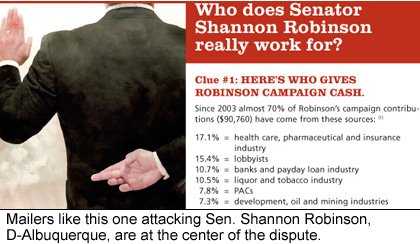Groups want federal judge to stop secretary of state’s attempt to require them to register as PACs
This article has been updated.
Two nonprofits filed a federal lawsuit on Tuesday in an attempt to try to block efforts by the secretary of state and attorney general to force them to register as political committees or pay steep fines.
The action was expected, as the nonprofits and government agencies reached an agreement several months ago to settle the issue in court. Tuesday’s lawsuit filed by SouthWest Organizing Project (SWOP) and the Center for Civic Policy’s New Mexico Youth Organized (NMYO) is their attempt to stop what the lawsuit calls the “chilling effect” the state agencies’ action has had on their right to free speech.
“Although NMYO and SWOP do not intend to register as political committees, the defendant’s threats to impose civil and criminal sanctions on them if they fail to register has had, and continues to have, a chilling effect on NMYO’s and SWOP’s protected activities,” the lawsuit states, adding that the groups have ceased sending out what they call issue-based mailers “because they fear enforcement of the (Campaign Reporting) Act against them and the Act’s related criminal and civil penalties.”
You can read the entire complaint, which was filed in U.S. District Court in Albuquerque, by clicking here. Spokesmen for Secretary of State Mary Herrera, the named defendant in the lawsuit, and Attorney General Gary King, the secretary of state’s attorney, did not immediately respond to requests for comment.
The primary purpose of NMYO, according to the complaint, “is to educate young New Mexicans regarding issues that are important to them,” while SWOP’s purpose is “to empower the New Mexico communities that it serves across the state — including Latinos and other people of color, low-income individuals, and young people — to realize racial and gender equality and social and economic justice.”
Earlier this year, King advised the secretary of state that the nonprofits had resorted to political campaigning in mailers like this one sent two to three months before the June primary targeting several lawmakers, including some who had primary opponents. The secretary of state ordered both groups to register as political committees and comply with the Campaign Reporting Act by regularly reporting contributions and expenditures publicly, just like candidates, campaigns and political action committees.
The groups say their mailers were related to a coming special session of the Legislature, not the election, and they shouldn’t have to register. King hasn’t shared the reasoning behind his advice beyond saying the key issue is the meaning of the phrase “political purpose” in the act. Attorneys for NMYO and SWOP, on the other hand, have laid out their legal arguments publicly in a letter to the secretary of state.
‘We were left with no choice’
In addition to the legal arguments laid out in that letter, attorneys for the nonprofits make one new argument in Tuesday’s complaint: that the statutes in the campaign reporting act that King’s office interprets to mean the nonprofits must register as political committees are unconstitutional because “they purport to regulate — and defendant has asserted that they do regulate — organizations engaging in issue advocacy rather than express political advocacy or its functional equivalent.”
Even if the statutes are constitutional as applied to some other groups, the complaint states, they are unconstitutional “as applied to Plaintiffs because the defendant cannot lawfully regulate Plaintiffs’ conduct.”
The groups are asking that a federal judge declare the statutes unconstitutional or, in the alternative, declare that they don’t apply to the nonprofits; that a judge stop the secretary of state from requiring them to register as political committees and imposing sanctions if they do not; and the a judge order that the state pay their legal fees.
“We’re concerned that if the secretary of state is allowed to arbitrarily order nonprofits to register as political committees without explanation it will muzzle the important civic engagement work of our sector,” Matt Brix, CCP’s policy director, said in a news release announcing the lawsuit. “While we didn’t want to file suit against the state, we were left with no choice. Nonprofit organizations have a responsibility to inform the public about the votes of elected officials and the source of their contributions. Furthermore, the public has a right to know what elected officials are doing in their name.”
Update, 2:35 p.m.
Phil Sisneros, spokesman for the AG, said his office has not been served with the lawsuit, but “regarding nonprofits engaging in electioneering activities, our position has not changed.”
By way of disclosure, I also write for the New Mexico Independent, which is owned by the Center for Independent Media in Washington. When the group was starting up its New Mexico news site earlier this year, the Center for Civic Policy helped it locate funding sources. The Center for Civic Policy has never tried to use that fact to influence anything I have written.

